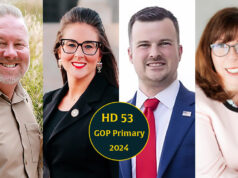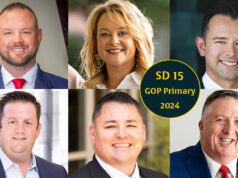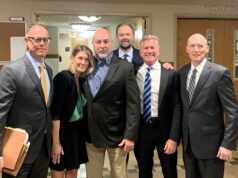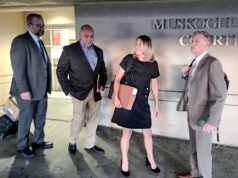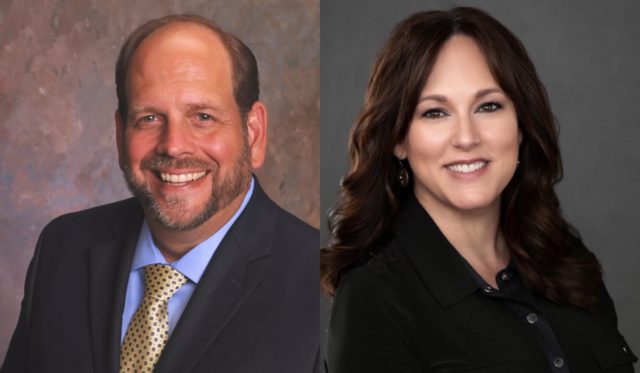

After tying for first place in a four-person June primary, two former educators will face off in the Aug. 23 Republican runoff to become House District 13’s Republican candidate.
Neil Hays, 49, and Carisa Rogers, 48, each received exactly 863 votes in June. The similarities between the candidates go beyond the number of votes they received: Both were raised in Muskogee County, both are former teachers who now say parents should have more control over what their children are taught, and both advocate for reducing regulations on businesses.
House District 13’s current representative is Avery Frix (R-Muskogee), who is running for Congress in Oklahoma’s 2nd Congressional District. HD 13 covers the northeastern corner of McIntosh County and central Muskogee County, including the city of Muskogee.
Tuesday’s winner will advance to face Democrat Jim Haley in November.
Candidates agree on indoctrination, differ on vouchers
Rogers, who was a public school teacher for three years, said in an interview that her highest priority is “protecting our children.” The first issue she mentioned was removing books with content she deems inappropriate from schools, and she said she would like there to be a state law requiring each school district to create a policy that allows parents to vet and potentially remove titles in school libraries.
“I want to make sure that a lot of these books that aren’t appropriate for children are out of the public school libraries, and that we’re not teaching our children through the lens of critical race theory,” Rogers said.
Rogers also mentioned diversity, equity and inclusion and social-emotional learning as curricula that should be off-limits because she believes they teach “attitudes, values, feelings and beliefs” that are consistent with leftist ideology.
On his website, Hays wrote he will “protect our children from critical race theory and trans-sports schemes,” and he also advocates for more parental involvement in education.
“Every parent should have a role with their child, and with what happens with their child in education,” Hays said.
Hays was once a high school teacher and coach at Hilldale High School, but he left education to open an insurance agency nearly a decade ago, saying he was unhappy with working conditions.
“Over half the state budget goes to funding, and I’m not sure where the money is all going. Why are teachers having to fund their own classrooms? I don’t get that. Why are teachers working outside their contract hours? I don’t get that,” Hays said. “We just have to fight to make sure the money that’s being allocated to education goes to where it should be (and) that it’s being spent appropriately.”
For this fiscal year, 44 percent of appropriated state spendng goes to common education, not including apportioned revenues and federal or local dollars.
Both Rogers and Hays said they support school choice, but they share reservations about what voucher programs might mean for public schools.
“I definitely started out fully in favor of school vouchers. I am leaning more towards a tax credit now,” Rogers said. “I don’t see that there’s any way that [voucher programs] can be done without hurting (public) schools financially.”
Hays said he might support legislation creating vouchers, but it would depend on the bill’s specific details and whether he thought it would create too much disparity between public and private schools.
“Parents should have the ability to take their kids wherever they want to go, but you can’t fund one without funding the other,” he said.
‘It feels like government interference’
Of all the matters Hays hopes to address in the Legislature, he said job growth in Oklahoma is “probably the primary issue.” He identified three main things Oklahoma could improve to ensure investments from employers: creating a business-friendly tax policy, improving infrastructure and promoting an educated workforce.
“Businesses are not going to flee to a high-tax state, they’re going to flee from a high-tax state,” Hays said. “We have to make sure that we have the tax structure set up that attracts businesses.”
He added that businesses will not want to come to the state without “top notch” roads, airports and port systems they can use to transport their goods.
According to Hays, lowering taxes and restrictions would be particularly helpful to energy businesses.
“One of the main causes of inflation right now is energy costs,” Hays said. “You have to take the regulations and restrictions off oil and natural gas.”
Rogers’ husband owns nursing homes, and she works with him to help manage the facilities. She said state policies can feel stifling for local businesses.
“There’s just so much regulation, and it feels like government interference, in my opinion,” Rogers said. “I’m always for rolling back regulations in almost every respect, (just) not to the point where things aren’t safe.”









